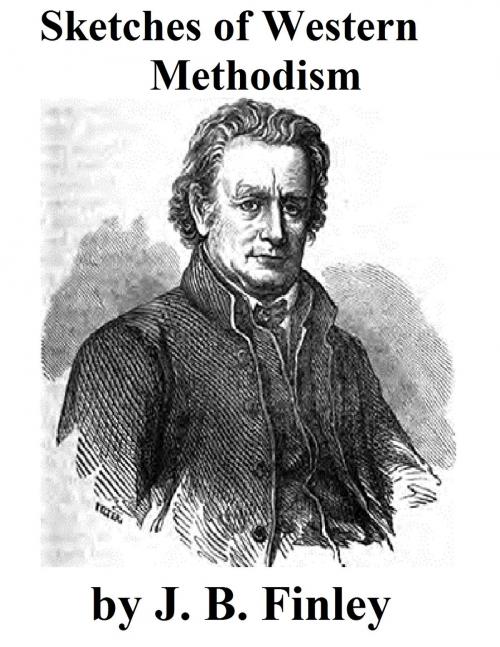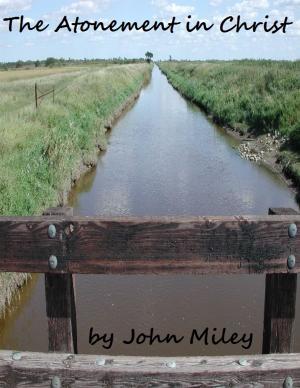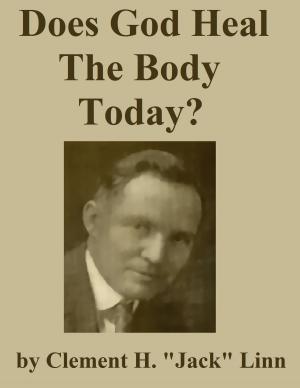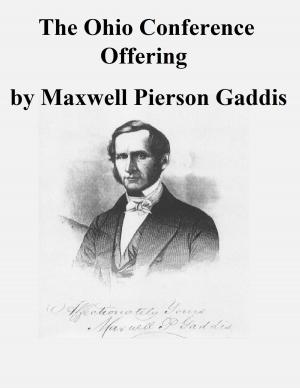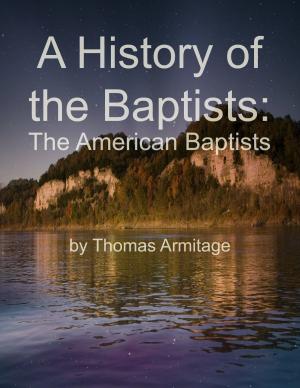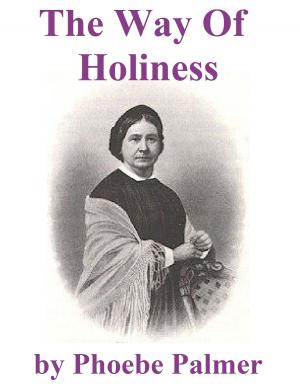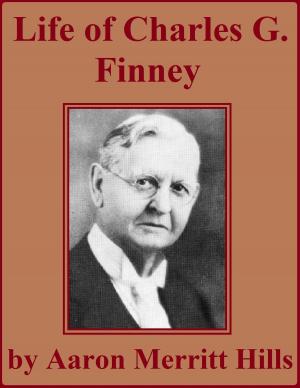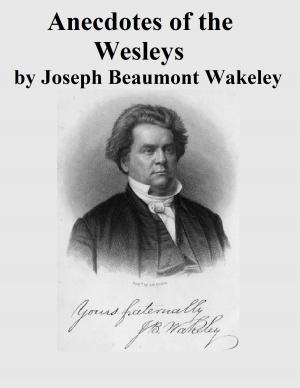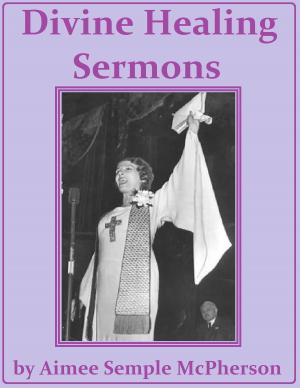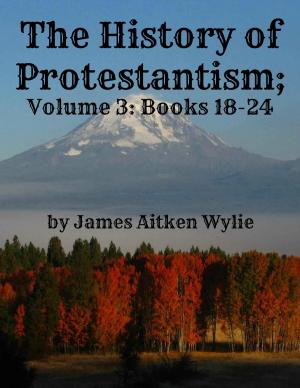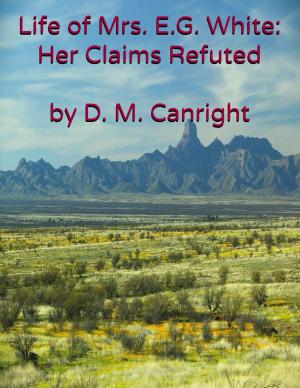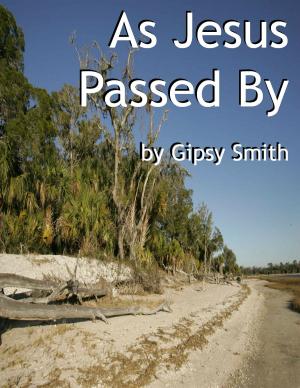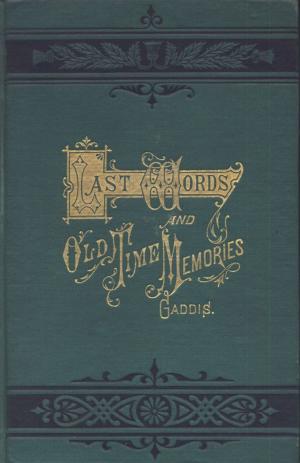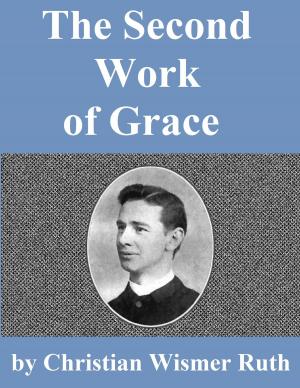Sketches Of Western Methodism
Nonfiction, Religion & Spirituality, Christianity, Denominations, Methodism, Missions & Missionary Work, History, Americas, United States, 19th Century| Author: | J. B. Finley | ISBN: | 1230000310131 |
| Publisher: | Jawbone Digital | Publication: | March 11, 2015 |
| Imprint: | Language: | English |
| Author: | J. B. Finley |
| ISBN: | 1230000310131 |
| Publisher: | Jawbone Digital |
| Publication: | March 11, 2015 |
| Imprint: | |
| Language: | English |
From the author's preface:
Our book explains itself, so far as the object we had in view in getting it up is concerned.
To supply a desideratum in the history of western Methodism, at least, so far as taking the incipient steps in that work is concerned, has prompted our endeavors. We have been at a great deal of labor in furnishing our readers with memorials of the past, connected with the lives of our early itinerant preachers, and collateral incidents in the history of the west, and we hope our labor has not been in vain.
Our readers will here find, as they turn over these pages, much, we trust, that is interesting and valuable in reference to olden time; and while they shall trace the life and labors of the pioneer Methodist preachers, in planting the standard of the cross in these western wilds before many of them were born, we hope they may be induced to engage with like zeal and devotion, to sustain the interests of the Church, and hand down to posterity, unimpaired and unadulterated, what our fathers have so nobly contented for in the well-fought field of itinerant life.
The noble examples furnished in these sketches, of untiring labor and self-sacrificing devotion of those who cheerfully gave up all for Christ and the advancement of his cause, should stir up every impulse of our nature to emulate their virtues and strive to imitate their truly-heroic deeds. We would that our materials had been more ample for the work we had undertaken, that the sketches we have given of the pioneers might have been more satisfactory. Much had already perished, and the waves of oblivion were rapidly washing out the few traces that remained; but we have gathered up what we could, and have presented them in a form, not only sufficiently reliable for all purposes of reference for the future historian, but, we flatter ourselves, sufficiently attractive to render the book one of interest to all.
Should our life be spared, we intend to prosecute this work still further; and as the materials will prove more abundant as we advance to the preachers of the present day, we hope to give increasing interest to our memorials of western Methodism. We have already promises from brethren in various conferences, spread over what was, in the days of our fathers, the Western conference, to warrant the expectation that a full and reliable history of our Church, and the many interesting incidents connected with its rise and progress in the great valley of the west, can be gathered up, that will prove a source of instruction and deep, powerful interest in rousing to higher activity, in promoting the advancement of the Redeemer's kingdom.
Table of Contents are as follows:
Chapter 1: INTRODUCTION OF METHODISM IN TO THE WEST
Chapter 2: AUTOBIOGRAPHY OF WILLIAM BURKE
Chapter 3: AUTOBIOGRAPHY CONTINUED
Chapter 4: MICHAEL ELLIS
Chapter 5: ORIGIN AND PROGRESS OF THE METHODISM IN CINCINNATI
Chapter 6: FRANCIS POYTHRESS
Chapter 7: BARNABAS McHENRY
Chapter 8: THOMAS SCOTT
Chapter 9: JOHN KOBLER
Chapter 10: BENJAMIN LAKIN
Chapter 11: JOHN SALE
Chapter 12: THE FIRST METHODIST CHURCHES IN OHIO
Chapter 13: SAMUEL PARKER
Chapter 14: LEARNER BLACKMAN
Chapter 15: LOST CHILD, OR, "THE CAMP OF LYDIA"
Chapter 16: JAMES AXLEY
Chapter 17: JOSEPH OGLESBY
Chapter 18: WILLIAM BEAUCHAMP
Chapter 19: GOVERNOR TIFFIN
Chapter 20: JOHN A. GRENADE
Chapter 21: THE WESTERN METHODIST BOOK CONCERN
Chapter 22: JOHN COLLINS
Chapter 23: NATHAN EMERY
Chapter 24: THE CONVERSION OF A FAMILY
Chapter 25: JOHN CRANE
Chapter 26: WILLIAM YOUNG
Chapter 27: THE CONVERSION OF AN INFIDEL
Chapter 28: ALEXANDER CUMMINS
Chapter 29: THE CONVERSION OF A CRUEL MASTER
Chapter 30: MARCUS LINDSEY
Chapter 31: THE GERMAN'S EXPERIENCE
Chapter 32: JOHN STRANGE
Chapter 33: WILLIAM FINLEY
Chapter 34: RUSSEL BIGELOW
Chapter 35: HENRY BASCOM
Chapter 36: SAMUEL HAMILTON
Chapter 37: WILLIAM ROPER
Chapter 38: JOHN ULIN
Chapter 39: WILLIAM PHILLIPS
Chapter 40: THE INTREPID MISSIONARY
Chapter 41: THOMAS DRUMMOND
Chapter 42: INDIAN CAMP MEETING
Chapter 43: CONVERSION OF AN INSPECTOR-GENERAL
Chapter 44: PIONEER WOMEN
Chapter 45: THE INDIAN CHIEF RHON-YAN-NESS
About the author:
James Bradley Finley was born in North Carolina, July 1, 1781 and was one of the most distinguished ministers of the M. E. Church in the West. He was converted in 1801, and in 1809 he was received on trial by the Western Conference, and traveled extensive fields of labor for six years. From 1816 to 1821 he was presiding elder of districts which embraced as much territory as an Annual Conference now contains. Through the instrumentality of a colored preacher (John Stewart) a revival had commenced among the Wyandott Indians at Upper Sandusky, O., and Finley was selected as a missionary to these "sons of the forest." This work he successfully prosecuted for six years, and from that time until 1845 he was preacher in the leading charges or was presiding elder of districts. At the solicitation of the directors of the Ohio penitentiary he was appointed chaplain, where he served three years and a half, until his health became impaired. He was elected eight times as delegate to the General Conference. He died Sept. 6, 1856. He was a man of great energy of character, of burning zeal, and of deep devotion to all the interests of the church. In quarterly meetings and at campmeetings he had great power over the masses, who were ofttimes wonderfully moved by his eloquence. He published several volumes, among which were an "Autobiography," "Wyandott Mission," "Sketches of Western Methodism," "Life among the Indians," and "Memorials of Prison Life."
From the author's preface:
Our book explains itself, so far as the object we had in view in getting it up is concerned.
To supply a desideratum in the history of western Methodism, at least, so far as taking the incipient steps in that work is concerned, has prompted our endeavors. We have been at a great deal of labor in furnishing our readers with memorials of the past, connected with the lives of our early itinerant preachers, and collateral incidents in the history of the west, and we hope our labor has not been in vain.
Our readers will here find, as they turn over these pages, much, we trust, that is interesting and valuable in reference to olden time; and while they shall trace the life and labors of the pioneer Methodist preachers, in planting the standard of the cross in these western wilds before many of them were born, we hope they may be induced to engage with like zeal and devotion, to sustain the interests of the Church, and hand down to posterity, unimpaired and unadulterated, what our fathers have so nobly contented for in the well-fought field of itinerant life.
The noble examples furnished in these sketches, of untiring labor and self-sacrificing devotion of those who cheerfully gave up all for Christ and the advancement of his cause, should stir up every impulse of our nature to emulate their virtues and strive to imitate their truly-heroic deeds. We would that our materials had been more ample for the work we had undertaken, that the sketches we have given of the pioneers might have been more satisfactory. Much had already perished, and the waves of oblivion were rapidly washing out the few traces that remained; but we have gathered up what we could, and have presented them in a form, not only sufficiently reliable for all purposes of reference for the future historian, but, we flatter ourselves, sufficiently attractive to render the book one of interest to all.
Should our life be spared, we intend to prosecute this work still further; and as the materials will prove more abundant as we advance to the preachers of the present day, we hope to give increasing interest to our memorials of western Methodism. We have already promises from brethren in various conferences, spread over what was, in the days of our fathers, the Western conference, to warrant the expectation that a full and reliable history of our Church, and the many interesting incidents connected with its rise and progress in the great valley of the west, can be gathered up, that will prove a source of instruction and deep, powerful interest in rousing to higher activity, in promoting the advancement of the Redeemer's kingdom.
Table of Contents are as follows:
Chapter 1: INTRODUCTION OF METHODISM IN TO THE WEST
Chapter 2: AUTOBIOGRAPHY OF WILLIAM BURKE
Chapter 3: AUTOBIOGRAPHY CONTINUED
Chapter 4: MICHAEL ELLIS
Chapter 5: ORIGIN AND PROGRESS OF THE METHODISM IN CINCINNATI
Chapter 6: FRANCIS POYTHRESS
Chapter 7: BARNABAS McHENRY
Chapter 8: THOMAS SCOTT
Chapter 9: JOHN KOBLER
Chapter 10: BENJAMIN LAKIN
Chapter 11: JOHN SALE
Chapter 12: THE FIRST METHODIST CHURCHES IN OHIO
Chapter 13: SAMUEL PARKER
Chapter 14: LEARNER BLACKMAN
Chapter 15: LOST CHILD, OR, "THE CAMP OF LYDIA"
Chapter 16: JAMES AXLEY
Chapter 17: JOSEPH OGLESBY
Chapter 18: WILLIAM BEAUCHAMP
Chapter 19: GOVERNOR TIFFIN
Chapter 20: JOHN A. GRENADE
Chapter 21: THE WESTERN METHODIST BOOK CONCERN
Chapter 22: JOHN COLLINS
Chapter 23: NATHAN EMERY
Chapter 24: THE CONVERSION OF A FAMILY
Chapter 25: JOHN CRANE
Chapter 26: WILLIAM YOUNG
Chapter 27: THE CONVERSION OF AN INFIDEL
Chapter 28: ALEXANDER CUMMINS
Chapter 29: THE CONVERSION OF A CRUEL MASTER
Chapter 30: MARCUS LINDSEY
Chapter 31: THE GERMAN'S EXPERIENCE
Chapter 32: JOHN STRANGE
Chapter 33: WILLIAM FINLEY
Chapter 34: RUSSEL BIGELOW
Chapter 35: HENRY BASCOM
Chapter 36: SAMUEL HAMILTON
Chapter 37: WILLIAM ROPER
Chapter 38: JOHN ULIN
Chapter 39: WILLIAM PHILLIPS
Chapter 40: THE INTREPID MISSIONARY
Chapter 41: THOMAS DRUMMOND
Chapter 42: INDIAN CAMP MEETING
Chapter 43: CONVERSION OF AN INSPECTOR-GENERAL
Chapter 44: PIONEER WOMEN
Chapter 45: THE INDIAN CHIEF RHON-YAN-NESS
About the author:
James Bradley Finley was born in North Carolina, July 1, 1781 and was one of the most distinguished ministers of the M. E. Church in the West. He was converted in 1801, and in 1809 he was received on trial by the Western Conference, and traveled extensive fields of labor for six years. From 1816 to 1821 he was presiding elder of districts which embraced as much territory as an Annual Conference now contains. Through the instrumentality of a colored preacher (John Stewart) a revival had commenced among the Wyandott Indians at Upper Sandusky, O., and Finley was selected as a missionary to these "sons of the forest." This work he successfully prosecuted for six years, and from that time until 1845 he was preacher in the leading charges or was presiding elder of districts. At the solicitation of the directors of the Ohio penitentiary he was appointed chaplain, where he served three years and a half, until his health became impaired. He was elected eight times as delegate to the General Conference. He died Sept. 6, 1856. He was a man of great energy of character, of burning zeal, and of deep devotion to all the interests of the church. In quarterly meetings and at campmeetings he had great power over the masses, who were ofttimes wonderfully moved by his eloquence. He published several volumes, among which were an "Autobiography," "Wyandott Mission," "Sketches of Western Methodism," "Life among the Indians," and "Memorials of Prison Life."
